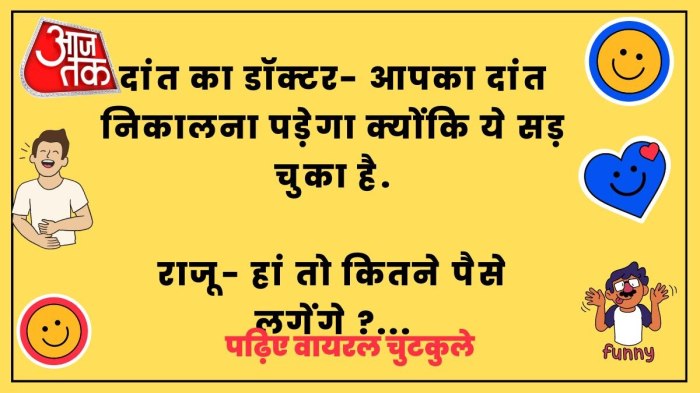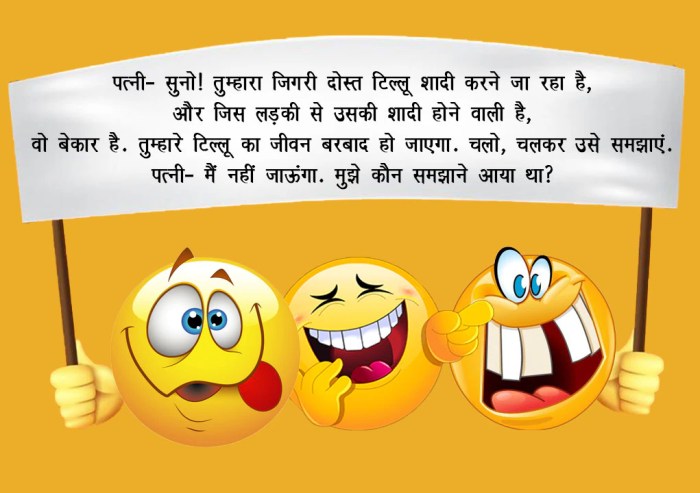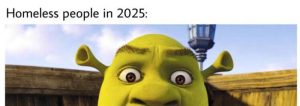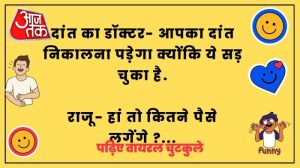
Ever wondered why some jokes conquer the internet, spawning countless shares and memes? We’re diving headfirst into the wild world of viral internet jokes! From the anatomy of a perfectly crafted punchline to the cultural impact of a well-timed meme, we’ll explore what makes a joke go viral and the surprising psychology behind our collective laughter.
Prepare for a rollercoaster ride through the digital humor landscape, uncovering the secrets behind viral sensations and exploring the ever-evolving trends that shape online comedy. We’ll examine how social media platforms fuel the fire, dissect the psychology of laughter, and even touch on the ethical considerations of sharing jokes online. Get ready to laugh, learn, and maybe even discover your next viral hit!
Defining “Viral Internet Jokes”
A viral internet joke is a humorous piece of content that spreads rapidly and widely across the internet, achieving significant reach and recognition within a short period. This spread is organic, driven by user sharing and engagement, rather than paid promotion. Its success hinges on a combination of factors related to its inherent humor, cultural relevance, and the ease with which it’s shared.Viral internet jokes are characterized by their brevity, memorability, and adaptability.
They often leverage relatable experiences, current events, or established cultural references to resonate with a broad audience. The ease of sharing, facilitated by social media platforms and messaging apps, is crucial to their rapid dissemination. A joke’s visual appeal, through memes or GIFs, can significantly enhance its virality. Furthermore, the use of simple, easily understood language contributes to its widespread appeal.
Types of Viral Internet Jokes
Viral internet jokes encompass a wide range of formats and styles. Memes, for instance, rely heavily on visual imagery coupled with short, punchy text. They often utilize established templates, allowing for easy adaptation and customization. Puns, on the other hand, utilize wordplay and double meanings for comedic effect, relying on linguistic dexterity and cleverness. Dark humor, which employs taboo subjects or morbid themes for comedic purposes, can also go viral, though its appeal is often niche and dependent on the audience’s tolerance for such material.
The success of each type depends on factors such as the specific humor used, its timeliness, and its ability to generate emotional responses (laughter, shock, recognition). Consider the “Drakeposting” meme, a visual meme utilizing a picture of Drake expressing preference between two options, which has been endlessly adapted to various situations. Or, consider the prevalence of puns related to current events; these often appear on social media platforms and quickly gain traction.
Finally, dark humor examples, such as those found in subreddits dedicated to dark humor, often involve ironic or unexpected twists on serious or tragic events, gaining popularity amongst specific audiences.
A Taxonomy for Viral Internet Jokes
A useful taxonomy for classifying viral internet jokes could be based on a combination of content and delivery method. Content could be categorized as: (1) Observational humor (relatable everyday situations), (2) Absurdist humor (illogical or nonsensical situations), (3) Wordplay (puns, etc.), (4) Dark humor (taboo or morbid themes), (5) Situational humor (based on specific events or contexts). Delivery methods could be classified as: (1) Text-based (tweets, captions), (2) Image-based (memes, GIFs), (3) Video-based (short clips, skits), (4) Audio-based (short audio clips, remixes).
Therefore, a viral joke could be categorized as, for instance, “Observational humor, delivered via image-based meme,” or “Wordplay, delivered via text-based tweet.” This taxonomy offers a systematic way to analyze and understand the various forms and mechanisms driving the virality of internet jokes. For example, a simple image macro with text expressing a relatable frustration would be classified as Observational humor, Image-based.
Conversely, a short video clip showcasing a comedic misunderstanding would be Situational humor, Video-based.
Cultural Impact and Trends
Viral internet jokes are more than just fleeting moments of amusement; they act as cultural barometers, reflecting and shaping societal attitudes, beliefs, and even political landscapes. Their rapid spread and widespread engagement offer a unique lens through which to examine evolving cultural trends and significant events. Analyzing these jokes provides insights into the collective consciousness and the ever-shifting dynamics of online communities.Viral jokes often mirror major cultural events, amplifying existing conversations or introducing new perspectives.
The rapid dissemination of these jokes allows for immediate and widespread commentary on current affairs, bypassing traditional media outlets and fostering a sense of shared experience amongst internet users globally. This can lead to both positive and negative consequences, shaping public opinion and influencing the discourse surrounding significant social and political issues.
Significant Cultural Events Reflected in Viral Jokes
Viral jokes frequently reflect significant cultural events. For example, the rise of political polarization in many countries has been mirrored in the proliferation of jokes targeting specific political figures or ideologies. Similarly, major global events, such as pandemics or economic crises, often inspire a wave of humor as people grapple with shared anxieties and uncertainties. These jokes, while often satirical, can provide a crucial coping mechanism and a platform for expressing collective feelings.
The rapid spread of jokes related to the COVID-19 pandemic, for instance, showcased the widespread anxieties and frustrations felt globally. Many jokes centered around lockdowns, mask-wearing, and the anxieties surrounding the virus itself.
Societal Attitudes and Beliefs Reflected in Viral Jokes
Viral jokes serve as a powerful reflection of societal attitudes and beliefs. The topics that consistently generate viral humor reveal underlying cultural values and anxieties. For example, the enduring popularity of jokes about workplace dynamics suggests a widespread identification with the challenges and frustrations of the modern work environment. Similarly, jokes focusing on family relationships often reflect evolving societal norms and expectations regarding family structures and dynamics.
The humor itself often acts as a social commentary, highlighting both the absurdities and the realities of these situations.
Viral Jokes Sparking Online Debates and Controversies
The very nature of viral content means that some jokes inevitably spark online debates and controversies. Jokes perceived as offensive or insensitive can generate significant backlash, leading to discussions about freedom of speech, cultural sensitivity, and the ethical implications of online humor. These controversies often highlight the complexities of navigating humor in a diverse and interconnected digital world.
For example, jokes targeting specific ethnic groups or minorities frequently trigger intense debates about inclusivity and the potential for harmful stereotypes to be perpetuated.
Timeline of Popular Joke Types
| Era | Joke Type | Example | Cultural Significance |
|---|---|---|---|
| Early 2000s | Chain emails, knock-knock jokes | “Knock knock. Who’s there? Lettuce. Lettuce who? Lettuce in! It’s cold out here!” | Simple, easily forwarded; reflected a simpler, less sophisticated online culture. |
| Mid-2000s | Image macros (Rage Comics) | “Success Kid” image macro depicting a child triumphantly clenching his fist. | Visual humor; reflected the rise of image-sharing platforms and meme culture. |
| Late 2000s – 2010s | Memes (e.g., LOLcats, Advice Animals) | “Forever Alone” meme featuring a sad, lonely cat. | Highly shareable, often using simple text alongside images; demonstrated the power of visual storytelling online. |
| 2010s – Present | Short-form videos, relatable situations | TikTok trends, comedic skits highlighting everyday struggles. | Reflects the dominance of short-form video platforms and a focus on relatable and highly personalized humor. |
Ethical Considerations of Viral Humor

The seemingly innocuous world of viral internet jokes harbors a complex ethical landscape. While humor can bring people together and provide a much-needed escape, the rapid spread of jokes online can have unforeseen and sometimes damaging consequences. Understanding these ethical implications is crucial for responsible participation in the digital humor ecosystem.The rapid dissemination of jokes online, often without context or critical analysis, can lead to the amplification of harmful stereotypes, the spread of misinformation, and the creation of a climate of online harassment.
This necessitates a careful examination of the responsibility held by both individuals and platforms in shaping the nature of online humor.
Harmful Stereotypes and Prejudice Amplification
Viral jokes frequently rely on humor derived from stereotypes, often targeting marginalized groups based on race, religion, gender, sexual orientation, or disability. The widespread sharing of such jokes normalizes and reinforces these harmful stereotypes, contributing to real-world prejudice and discrimination. For example, jokes targeting a specific ethnic group, even if seemingly lighthearted, can perpetuate negative perceptions and fuel discriminatory behavior.
The virality of these jokes magnifies their impact, reaching a far wider audience than a single offline interaction ever could. This underscores the need for critical evaluation of the content we share and consume.
Misinformation and the Spread of False Narratives
The speed at which jokes spread online can facilitate the dissemination of misinformation. Jokes presented as factual accounts can quickly gain traction, regardless of their truthfulness. This can have serious consequences, particularly when the false narrative relates to sensitive topics like public health or political events. For instance, a fabricated joke about a public health crisis might discourage people from taking necessary precautions, resulting in real-world harm.
The lack of fact-checking mechanisms inherent in viral sharing contributes to this problem.
Online Harassment and Cyberbullying
Many viral jokes target individuals, often leading to online harassment and cyberbullying. Jokes that ridicule someone’s appearance, beliefs, or personal circumstances can have a devastating impact on their mental health and well-being. The anonymity afforded by the internet can embolden individuals to participate in such behavior, while the virality of the joke amplifies the harm inflicted. The scale of reach can turn a single instance of bullying into a widespread campaign of online harassment.
This highlights the urgent need for online platforms to implement robust mechanisms for reporting and addressing such abusive content.
Responsibility of Individuals and Platforms
Individuals have a responsibility to critically evaluate the jokes they share, considering their potential impact on others. This includes being mindful of the stereotypes perpetuated, the accuracy of information conveyed, and the potential for causing harm. Platforms, on the other hand, have a role in developing and implementing effective content moderation policies that address the spread of harmful jokes.
This might involve improved algorithms to detect offensive content, enhanced reporting mechanisms, and proactive measures to combat online harassment. A collaborative effort between individuals and platforms is essential to create a safer and more responsible online environment.
Guidelines for Responsible Joke Creation and Sharing
Creating and sharing jokes responsibly requires a thoughtful approach. Before sharing a joke, consider the following: Does it perpetuate harmful stereotypes? Is the information accurate? Could it cause emotional distress or harm to anyone? If the answer to any of these questions is yes, it is advisable to reconsider sharing the joke.
Furthermore, actively challenge and report jokes that are harmful or offensive. Promoting a culture of responsible humor requires collective effort and a commitment to fostering a positive and inclusive online environment.
Outcome Summary

So, there you have it – a whirlwind tour through the fascinating world of viral internet jokes! We’ve explored the science behind the smiles, the platforms that propel the punchlines, and the cultural impact of our shared laughter. Remember, the next viral joke might be just around the corner, waiting to be discovered and shared. Keep your eyes peeled, your sense of humor sharp, and your social media feeds ready for the next big laugh!
FAQ Compilation
What’s the difference between a meme and a viral joke?
While often overlapping, memes are usually visual and rely on repeated imagery or formats, whereas viral jokes can be text-based, puns, or short videos – the core is the humor itself.
How long does a viral joke typically last?
It varies wildly! Some jokes are fleeting, lasting only days, while others enjoy a longer lifespan, potentially resurfacing years later.
Can I predict which joke will go viral?
Unfortunately, no crystal ball exists! Virality is a complex mix of timing, platform, humor style, and a dash of unpredictable luck.
Are there any legal issues with using viral jokes?
Copyright can be tricky. Using someone else’s joke without permission, especially for commercial purposes, could lead to trouble. Always respect intellectual property rights.






